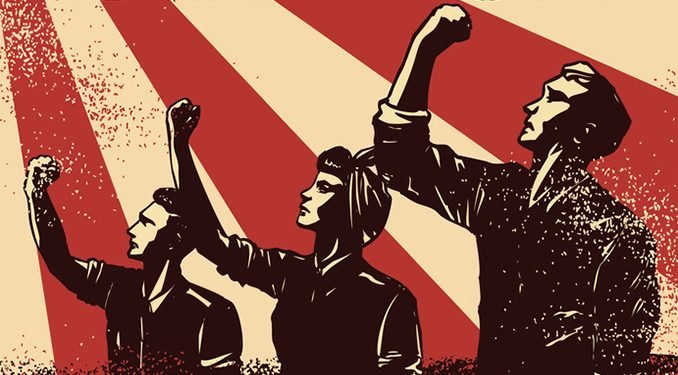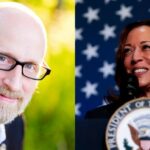Blog Post
America is replacing religion with politics–and the consequences are ugly
Gallons of ink could be spilled in explaining the many ways the prognosticators of the New Atheist movement turned out to be false prophets. Men like the late Christopher Hitchens crowed that the number of people abandoning Christianity and identifying as “nones” continued to skyrocket as the 2000s dawned, and that this trend would usher in an age free of the religious fervor that propelled men to fly planes into skyscrapers. Hitchens and his fellow New Atheists rejected the idea that there is any innate need for faith or religion—which, as Hitchens put it in the title of his lazy atheist screed, “poisons everything.”
The assumption was that as Christianity faded, the values of the Enlightenment would replace the regressive moral laws of a dead deity. In part, this was the myth of Progress—and as always, faith and tradition had to be demolished to make way for a civilization founded in the image of the intellectual elites. The atheists, of course, were pretty sure that was them.
Twenty years into the new millennium, and it is now clear that things are not turning out that way. As I noted in a recent essay, many agnostic and atheist intellectuals are beginning to fear what will fill the void left by Christianity. Richard Dawkins has, almost unbelievably, launched a few tepid defences of Christianity while clinging to his devout atheism. Sam Harris, another of the founding New Atheists, displayed palpable frustration in his discussions on this subject with Jordan Peterson and Douglas Murray, both of whom are agnostics—and both of whom now believe that the Enlightenment of taking Christianity’s place.
Earlier this year, Shadi Hamid had an insightful essay on the subject of America’s growing secularization in The Atlantic which highlighted, once again, how definitively the hopes of the New Atheists have been dashed. As Christianity fades, Hamid observes, ideological intensity in America has risen rather than fallen. While church membership remained stable at around 70% from 1937 to 1998, it began to plummet during the last twenty years. It now sits around 50%, while the number of those claiming no religion—once a matter of great satisfaction to the atheists—has grown to nearly a quarter of the population. But, as Hamid observes, the Enlightenment paradise of atheist fantasy has not emerged:
But if secularists hoped that declining religiosity would make for more rational politics, drained of faith’s inflaming passions, they are likely disappointed. As Christianity’s hold, in particular, has weakened, ideological intensity and fragmentation have risen. American faith, it turns out, is as fervent as ever; it’s just that what was once religious belief has now been channeled into political belief. Political debates over what America is supposed to mean have taken on the character of theological disputations. This is what religion without religion looks like.
Not so long ago, I could comfort American audiences with a contrast: Whereas in the Middle East, politics is war by other means—and sometimes is literal war—politics in America was less existentially fraught. During the Arab Spring, in countries like Egypt and Tunisia, debates weren’t about health care or taxes—they were, with sometimes frightening intensity, about foundational questions: What does it mean to be a nation? What is the purpose of the state? What is the role of religion in public life? American politics in the Obama years had its moments of ferment—the Tea Party and tan suits—but was still relatively boring.
We didn’t realize how lucky we were. Since the end of the Obama era, debates over what it means to be American have become suffused with a fervor that would be unimaginable in debates over, say, Belgian-ness or the “meaning” of Sweden. It’s rare to hear someone accused of being un-Swedish or un-British—but un-American is a common slur, slung by both left and right against the other. Being called un-American is like being called “un-Christian” or “un-Islamic,” a charge akin to heresy.
This is because America itself is “almost a religion,” as the Catholic philosopher Michael Novak once put it, particularly for immigrants who come to their new identity with the zeal of the converted. The American civic religion has its own founding myth, its prophets and processions, as well as its scripture—the Declaration of Independence, the Constitution, and The Federalist Papers. In his famous “I Have a Dream” speech, Martin Luther King Jr. wished that “one day this nation will rise up and live out the true meaning of its creed.” The very idea that a nation might have a creed—a word associated primarily with religion—illustrates the uniqueness of American identity as well as its predicament.
The notion that all deeply felt conviction is sublimated religion is not new. Abraham Kuyper, a theologian who served as the prime minister of the Netherlands at the dawn of the 20th century, when the nation was in the early throes of secularization, argued that all strongly held ideologies were effectively faith-based, and that no human being could survive long without some ultimate loyalty. If that loyalty didn’t derive from traditional religion, it would find expression through secular commitments, such as nationalism, socialism, or liberalism. The political theorist Samuel Goldman calls this “the law of the conservation of religion”: In any given society, there is a relatively constant and finite supply of religious conviction. What varies is how and where it is expressed.
No longer explicitly rooted in white, Protestant dominance, understandings of the American creed have become richer and more diverse—but also more fractious. As the creed fragments, each side seeks to exert exclusivist claims over the other. Conservatives believe that they are faithful to the American idea and that liberals are betraying it—but liberals believe, with equal certitude, that they are faithful to the American idea and that conservatives are betraying it. Without the common ground produced by a shared external enemy, as America had during the Cold War and briefly after the September 11 attacks, mutual antipathy grows, and each side becomes less intelligible to the other. Too often, the most bitter divides are those within families.
No wonder the newly ascendant American ideologies, having to fill the vacuum where religion once was, are so divisive. They are meant to be divisive. On the left, the “woke” take religious notions such as original sin, atonement, ritual, and excommunication and repurpose them for secular ends. Adherents of wokeism see themselves as challenging the long-dominant narrative that emphasized the exceptionalism of the nation’s founding. Whereas religion sees the promised land as being above, in God’s kingdom, the utopian left sees it as being ahead, in the realization of a just society here on Earth. After Supreme Court Justice Ruth Bader Ginsburg died in September, droves of mourners gathered outside the Supreme Court—some kneeling, some holding candles—as though they were at the Western Wall.
On the right, adherents of a Trump-centric ethno-nationalism still drape themselves in some of the trappings of organized religion, but the result is a movement that often looks like a tent revival stripped of Christian witness. Donald Trump’s boisterous rallies were more focused on blood and soil than on the son of God. Trump himself played both savior and martyr, and it is easy to marvel at the hold that a man so imperfect can have on his soldiers. Many on the right find solace in conspiracy cults, such as QAnon, that tell a religious story of earthly corruption redeemed by a godlike force.
Though the United States wasn’t founded as a Christian nation, Christianity was always intertwined with America’s self-definition. Without it, Americans—conservatives and liberals alike—no longer have a common culture upon which to fall back.
This isn’t simply a situation of the centre not being able to hold so much as not having a centre at all. The resulting division and polarization was predictable—indeed, predicted—by those who warned that societies cannot be held together by ephemeral ideologies and Darwinian self-interest. But here we are:
Unfortunately, the various strains of wokeism on the left and Trumpism on the right cannot truly fill the spiritual void—what the journalist Murtaza Hussain calls America’s “God-shaped hole.” Religion, in part, is about distancing yourself from the temporal world, with all its imperfection. At its best, religion confers relief by withholding final judgments until another time—perhaps until eternity. The new secular religions unleash dissatisfaction not toward the possibilities of divine grace or justice but toward one’s fellow citizens, who become embodiments of sin—“deplorables” or “enemies of the state.”…
Absent some new religious awakening, what are we left with? One alternative to American intensity would be a world-weary European resignation. Violence has a way of taming passions, at least as long as it remains in active memory. In Europe, the terrors of the Second World War are not far away. But Americans must go back to the Civil War for violence of comparable scale—and for most Americans, the violence of the Civil War bolsters, rather than undermines, the national myth of perpetual progress. The war was redemptive—it led to a place of promise, a place where slavery could be abolished and the nation made whole again. This, at least, is the narrative that makes the myth possible to sustain.
For better and worse, the United States really is nearly one of a kind. France may be the only country other than the United States that believes itself to be based on a unifying ideology that is both unique and universal—and avowedly secular. The French concept of laïcité requires religious conservatives to privilege being French over their religious commitments when the two are at odds. With the rise of the far right and persistent tensions regarding Islam’s presence in public life, the meaning of laïcité has become more controversial. But most French people still hold firm to their country’s founding ideology: More than 80 percent favor banning religious displays in public, according to one recent poll…
Hamid reaches a dangerous but inevitable conclusion:
Can religiosity be effectively channeled into political belief without the structures of actual religion to temper and postpone judgment? There is little sign, so far, that it can. If matters of good and evil are not to be resolved by an omniscient God in the future, then Americans will judge and render punishment now. We are a nation of believers. If only Americans could begin believing in politics less fervently, realizing instead that life is elsewhere. But this would come at a cost—because to believe in politics also means believing we can, and probably should, be better.
In History Has Begun, the author, Bruno Maçães—Portugal’s former Europe minister—marvels that “perhaps alone among all contemporary civilizations, America regards reality as an enemy to be defeated.” This can obviously be a bad thing (consider our ineffectual fight against the coronavirus), but it can also be an engine of rejuvenation and creativity; it may not always be a good idea to accept the world as it is. Fantasy, like belief, is something that humans desire and need. A distinctive American innovation is to insist on believing even as our fantasies and dreams drift further out of reach.
This may mean that the United States will remain unique, torn between this world and the alternative worlds that secular and religious Americans alike seem to long for. If America is a creed, then as long as enough citizens say they believe, the civic faith can survive. Like all other faiths, America’s will continue to fragment and divide. Still, the American creed remains worth believing in, and that may be enough. If it isn’t, then the only hope might be to get down on our knees and pray.
He’s right—and I suspect that someday soon, even those who hated Christianity may realize, as a growing number of intellectuals have begun to, that religion was America’s soul—and that a soulless nation is a dangerous place to live.








